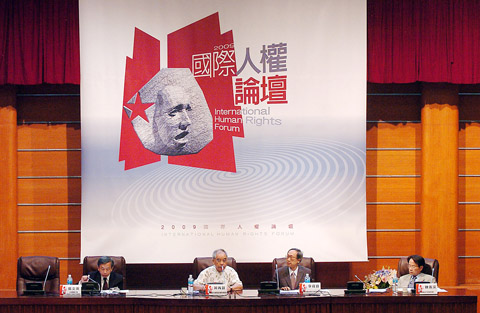China’s emergence as a new economic power may be threatening human rights and freedom in other countries, speakers at the International Human Rights Forum in Taipei said yesterday.
“Twenty years ago, the world condemned the Chinese Communist Party [CCP] regime for its crackdown on the Tiananmen Square demonstrations,” said former presidential adviser Ruan Ming (阮銘), a one-time CCP official who was forced into exile in the late 1980s for promoting political reform.
“Now things are a little different, with Beijing and Wall Street working to bring a new economic order to the world: China makes the merchandise and Wall Street invests,” Ruan told the forum, hosted by the Memorial Foundation of 228.

PHOTO: LO PEI-DER, TAIPEI TIMES
Ruan said US economists were increasingly interested in the profits to be made by investing in China, while overlooking human rights abuses there.
“In fact, in addition to exporting goods, the CCP is also exporting ideas against human rights, freedom and democracy,” he said, citing as examples China’s support of the authoritarian regimes in North Korea, Myanmar, Zimbabwe, Iran and Cuba.
“This crisis of democracy is not just a crisis for Taiwan, but for the entire world,” he said.
Exiled Chinese democracy activist Wang Dan (王丹) said “the CCP is trying to tell the world that the economy is more important than remembering Tiananmen Square.”
“It’s the 20th anniversary of the Tiananmen Square [Massacre], yet no one seems to care much,” he said. “This is especially apparent in Taiwan.”
He called on Taiwanese to support Chinese democracy activists in countering the CCP regime.
For many, “human rights” and “freedom” are abstract concepts, World Uyghur Congress president Rabiye Kadeer said.
They think they will never have to face political persecution as long as they do not participate in political activities, but an authoritarian government can affect all aspects of life and even destroy an entire people, she said.
“Over the past 60 years since China occupied East Turkestan [also known as Xinjiang], its violation of the Uighurs’ civil, political, economic, social and cultural rights has never stopped,” Rabiye said in a statement.
She was unable to attend yesterday’s forum because it conflicted with a World Uyghur Congress meeting in Washington.
“While Chinese immigrants continue to pour into East Turkestan, the Uighurs are faced with the crisis of becoming a minority in our own land and [watching our] culture die out,” the statement said.
“Uighurs are arrested for no reason, religious practices are banned. We face discrimination in terms of economic activities and education and we’re even discouraged from using our language,” it said.
Political commentator Paul Lin (林保華), another panelist at the forum, said that in 1954, Uighurs accounted for 75 percent of the population in Xinjiang, but today are believed to make up less than 50 percent of the population.
Lin said that studies in Japan indicated that China’s nuclear tests in Xinjiang had killed more than 190,000 Uighurs, while affecting the health of another 1.3 million locals and 270,000 Japanese tourists who have visited the region.
“China often accuses the Uighurs of being terrorists, but I wonder who the real terrorists are,” Lin said.

‘DENIAL DEFENSE’: The US would increase its military presence with uncrewed ships, and submarines, while boosting defense in the Indo-Pacific, a Pete Hegseth memo said The US is reorienting its military strategy to focus primarily on deterring a potential Chinese invasion of Taiwan, a memo signed by US Secretary of Defense Pete Hegseth showed. The memo also called on Taiwan to increase its defense spending. The document, known as the “Interim National Defense Strategic Guidance,” was distributed this month and detailed the national defense plans of US President Donald Trump’s administration, an article in the Washington Post said on Saturday. It outlines how the US can prepare for a potential war with China and defend itself from threats in the “near abroad,” including Greenland and the Panama

The Chinese Nationalist Party (KMT) is maintaining close ties with Beijing, the Democratic Progressive Party (DPP) said yesterday, hours after a new round of Chinese military drills in the Taiwan Strait began. Political parties in a democracy have a responsibility to be loyal to the nation and defend its sovereignty, DPP spokesman Justin Wu (吳崢) told a news conference in Taipei. His comments came hours after Beijing announced via Chinese state media that the Chinese People’s Liberation Army’s Eastern Theater Command was holding large-scale drills simulating a multi-pronged attack on Taiwan. Contrary to the KMT’s claims that it is staunchly anti-communist, KMT Deputy

RESPONSE: The government would investigate incidents of Taiwanese entertainers in China promoting CCP propaganda online in contravention of the law, the source said Taiwanese entertainers living in China who are found to have contravened cross-strait regulations or collaborated with the Chinese Communist Party (CCP) could be subject to fines, a source said on Sunday. Several Taiwanese entertainers have posted on the social media platform Sina Weibo saying that Taiwan “must be returned” to China, and sharing news articles from Chinese state media. In response, the Mainland Affairs Council (MAC) has asked the Ministry of Culture to investigate whether the entertainers had contravened any laws, and asked for them to be questioned upon their return to Taiwan, an official familiar with the matter said. To curb repeated

Myanmar has turned down an offer of assistance from Taiwanese search-and-rescue teams after a magnitude 7.7 earthquake struck the nation on Friday last week, saying other international aid is sufficient, the National Fire Agency said yesterday. More than 1,700 have been killed and 3,400 injured in the quake that struck near the central Myanmar city of Mandalay early on Friday afternoon, followed minutes later by a magnitude 6.7 aftershock. Worldwide, 13 international search-and-rescue teams have been deployed, with another 13 teams mobilizing, the agency said. Taiwan’s search-and-rescue teams were on standby, but have since been told to stand down, as